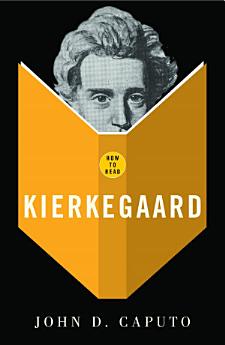How To Read Kierkegaard
এপ্রি ২০১৪ · Granta Books
৪.০star
৩টি রিভিউreport
ই-বুক
142
পৃষ্ঠা
reportরেটিং ও রিভিউ যাচাই করা হয়নি আরও জানুন
এই ই-বুকের বিষয়ে
Soren Kierkegaard is one of the prophets of the contemporary age, a man whose acute observations on life in nineteenth-century Copenhagen might have been written yesterday, whose work anticipated fundamental developments in psychoanalysis, philosophy, theology and the critique of mass culture by over a century. John Caputo offers a compelling account of Kierkegaard as a thinker of particular relevance in our postmodern times, who set off a revolution that numbers Martin Heidegger and Karl Barth among its heirs. His conceptions of truth as a self-transforming 'deed' and his haunting account of the 'single individual' seemed to have been written with us especially in mind. Extracts include Kierkegaard's classic reading of the story of Abraham and Isaac, the jolting theory that truth is subjectivity and his ground-breaking analysis of the concept of anxiety.
রেটিং ও পর্যালোচনাগুলি
৪.০
৩টি রিভিউ
লেখক সম্পর্কে
John D. Caputo is the Thomas J. Watson Professor of Religion and Humanities at Syracuse University and a specialist in the interface between postmodern thought and contemporary religion. His newest books are The Weakness of God: A Theology of the Event and Augustine and Postmodernism. He is also the author of On Religion.
ই-বুকে রেটিং দিন
আপনার মতামত জানান।
পঠন তথ্য
স্মার্টফোন এবং ট্যাবলেট
Android এবং iPad/iPhone এর জন্য Google Play বই অ্যাপ ইনস্টল করুন। এটি আপনার অ্যাকাউন্টের সাথে অটোমেটিক সিঙ্ক হয় ও আপনি অনলাইন বা অফলাইন যাই থাকুন না কেন আপনাকে পড়তে দেয়।
ল্যাপটপ ও কম্পিউটার
Google Play থেকে কেনা অডিওবুক আপনি কম্পিউটারের ওয়েব ব্রাউজারে শুনতে পারেন।
eReader এবং অন্যান্য ডিভাইস
Kobo eReaders-এর মতো e-ink ডিভাইসে পড়তে, আপনাকে একটি ফাইল ডাউনলোড ও আপনার ডিভাইসে ট্রান্সফার করতে হবে। ব্যবহারকারীর উদ্দেশ্যে তৈরি সহায়তা কেন্দ্রতে দেওয়া নির্দেশাবলী অনুসরণ করে যেসব eReader-এ ফাইল পড়া যাবে সেখানে ট্রান্সফার করুন।






